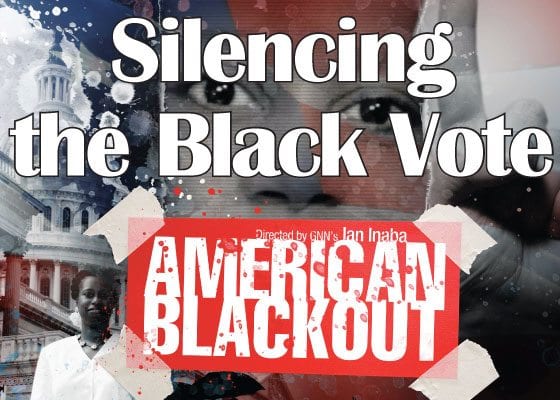‘American Blackout’ looks at the recent past and asks: Will all of our votes count?


‘American Blackout’ looks at the recent past and asks: Will all of our votes count?
As the presidential election draws closer and tens of millions prepare to go to the polls, some community and voting rights activists are concerned — not only about whether all citizens will be allowed to vote, but also whether all of their ballots will be counted.
To fully inform the public about protecting their right to vote, activists across the country have been organizing screenings of the documentary “American Blackout.” Greater Boston audiences will have two opportunities to see the award-winning documentary in the coming weeks — tomorrow night at the Democracy Center in Cambridge, and next Thursday, Oct. 16, at the Roxbury offices of Alternatives for Community and Environment.
Honored with a Special Jury Prize at the 2006 Sundance Film Festival, the film details numerous cases over the past eight years in which black voters have been disenfranchised.
The documentary opens with a flurry of footage from Florida in 2000, where officials ultimately called the contested presidential election for Republican nominee George W. Bush by a razor-thin margin of 537 votes. Rather than debate the well-worn territory of the subsequent vote recount, “American Blackout” zeroes in on the purging from the voting rolls of tens of thousands of Floridians suspected of being ex-felons.
Nearly all of the roughly 60,000 people removed from the state’s voter list had never committed a crime, but were prevented from casting a ballot on Election Day. Most were African Americans.
“Florida was an apartheid election, a Jim Crow election,” independent journalist Greg Palast says during the film. “That’s what happened.”
The film then shifts to Cynthia McKinney, then a Georgia Democrat in the House of Representatives, who became the only member of Congress to challenge the election’s certification. She called a hearing on racial disenfranchisement to investigate why the voter list provided to the Florida Board of Elections by data analysis company ChoicePoint/DBT was riddled with inaccuracies.
McKinney becomes the focal point of the film, as her outspoken criticism of the voter disenfranchisement — and later, the Bush administration’s response to the Sept. 11, 2001 attacks — make her the target of a Republican effort to unseat her during the 2002 congressional midterm election.
Rather than removing voters from the election list, this effort funded the campaign of another black woman during the Democratic primary and turned out thousands of Republicans to vote against McKinney in her own party’s primary. Although legal in Georgia, many contend that the state’s open primary had been used to disenfranchise African Americans.
“It transformed Southern politics when black people started registering and voting,” says U.S. Rep. John Conyers, D-Mich., in the film. “So what happened in Florida and Georgia reminded me of the dark past.”
After losing her seat, McKinney would remain a harsh critic of the Bush administration, ultimately returning to the House in 2004, only to lose her seat in 2006 after another Republican crossover vote in the Democratic primary. Following her second defeat, McKinney committed herself to anti-war activism and is now the Green Party nominee for president in the upcoming November election.
Amee Chew, a community activist helping to organize the local screenings of “American Blackout,” said she was first drawn to the film through her interest in McKinney’s third-party campaign.
“When I first saw ‘American Blackout,’ it reminded me of documentaries about the voting rights struggles of the civil rights movement and made me think about what it means to roll back those gains,” said Chew.
“American Blackout” also calls attention to efforts — similar to those seen in Florida in 2000 — that prevented thousands of black voters in Ohio from casting ballots in 2004.
In cities like Columbus and Cincinnati, where record numbers of new voters had been registered, election officials took voting machines out of some urban precincts and moved them to the suburbs. With only a handful of voting machines in those city polling places, thousands waited in two- or three-hour-long lines. Others had their registration challenged by election officials and were only able to vote by provisional ballot.
Some fear a repeat of the occurrences in that crucial swing state in the 2004 presidential election in other swing states this time around.
Ohio and Florida have again purged tens of thousands of names from state voting lists by using methods that disproportionately impact African Americans. In Indiana, election officials will be guided by a controversial law passed in 2005 that requires voters to produce a driver’s license or a passport at the polls. Published reports out of Michigan have stated that Republican officials plan to challenge the eligibility of voters who have lost their homes to foreclosure.
“We are sold a lot of propaganda on what voting means, but there are a lot of shocking things about the way the electoral system gets used to rob us of what little influence we have,” said Chew.
In Massachusetts, Chew pointed to longtime incumbent Second Suffolk District state Sen. Dianne Wilkerson’s recent loss by just 213 votes to Sonia Chang-Diaz in the Sept. 16 Democratic primary election. Chew compared Wilkerson’s loss to the targeting of McKinney, specifically citing the change of several Second Suffolk voting locations the week before the primary took place.
“In both instances, there was voter disenfranchisement in a racist way, whether it was voters crossing over to vote in the Democratic primary or the way they switched all the polling places in the last minute,” she said. “In both instances, people with power find a way to beat the system, even against Democrats.”
“American Blackout” will be screened tomorrow, Oct. 10, at 6 p.m. at the Democracy Center, 45 Mt. Auburn Street, Cambridge, and next Thursday, Oct. 16, at 5:30 p.m. at Alternatives for Community and Environment, 2181 Washington Street, Roxbury.
For more information, visit www.americanblackout.org.






